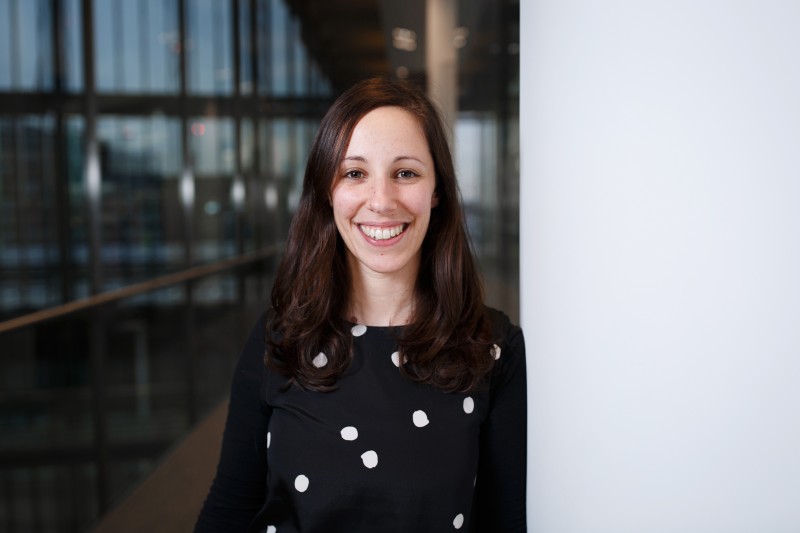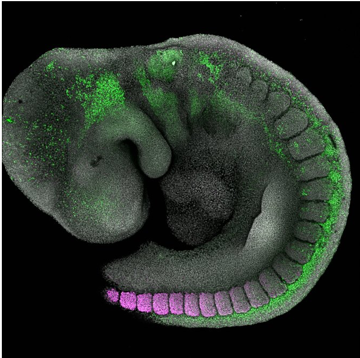By Sophie Arthur
April 24, 2020
Time to read: 7 minutes
“I remember always having an interest in science. Although, I didn’t actually study much biology when I was at high school, as I was more focused on maths and chemistry. You may know that we have a bit of a toad problem in Australia, so the senior high school practical in biology involved capturing a toad, which I was terrified of doing. So, the first few years at university were a bit of a challenge, as I had no concept of what a cell was. But I can recall, after my first practical at university, walking away thinking how incredibly fascinating animal biology is.”

Dr Vicki Metzis is the latest Group Head to join the MRC LMS. Having started out her research career as a summer student in the lab of Carol Wicking at the University of Queensland; the lab she would eventually join to pursue her PhD research looking at the role of the sonic hedgehog pathway in craniofacial development. Having developed an interest in studying genes in development, Vicki was motivated to learn a complementary system to in vivo models that would allow her to dig deeper into the mechanisms that control cell fate decisions. She pursued her post-doctoral training in the lab of James Briscoe at The Francis Crick Institute in London, where she developed expertise in the use of embryonic stem cells and their application to high-throughput sequencing methods and computational biology. Using these approaches, her work has provided insight into how the nervous system is regionalised into brain and spinal cord territories during development. In 2020, Vicki joined the MRC LMS and set up the Development and Transcriptional Control group to further her work on nervous system development and the role of the non-coding genome in regulating cell fate decisions.
“After finishing my science degree and my honours project – the equivalent of a Master’s degree here in the UK – I still wasn’t sure about research being the right path for me. This was even despite doing an undergrad project looking at limb bud development that felt really cutting edge and exciting. In Carol’s lab, we were studying novel genes, and it was very thrilling to develop assays where we could manipulate and study gene regulation within the context of a developing limb. But the progress was slow and the career path increasingly difficult due to the nature of funding. I was fortunate that the lab I had been working in had some funding for a research assistant, and I took the job expecting to eventually leave and “find a real job”. To my surprise, halfway through my time in that role, I realised I wanted to learn more. I also remember being completely sold after the Australian Developmental Biology meeting where I had the rare opportunity to meet a number of key people in my field from all over the world, including Patrick Tam, Liz Robertson, and Gail Martin. That was life changing to me. My interest in basic science continued to grow. It seemed that there was so much to learn about how the genome functioned, and how genes were controlled, and what they were actually doing. This ultimately impacts our understanding of what makes us human, and what goes wrong in disease. It’s what still drives me, and I’d say many developmental biologists, today. I never thought academia would be a path relevant to me. But what it boils down to is having a passion – some might say obsession! – in understanding how things work.”
Vicki is a Sir Henry Dale Fellow, supported by Wellcome and The Royal Society. Her group will be looking at three main areas of research whilst trying to understand how cell fate decisions are controlled in the nervous system. The first is regional identity and how the right cell types end up in the right places at either the head or trunk of the body. The second is tissue engineering using embryonic stem cells which will allow Vicki and her group to understand which signals direct cell fate decisions and how this is controlled at a molecular level. The final piece of the puzzle is to look at the non-coding genome, and how these regulatory regions of our DNA influence the repertoire of cell fates that can develop in an embryo.

“We are interested in the CDX family of transcription factors. We know that they help to set up posterior cell fates like the spinal cord. But we want to look at exactly how this happens, by studying how they exert their effects on the genome. Not only in the development of the nervous system but also their influence on the body plan as a whole. WNT signalling is something else we are interested in as it plays important roles in regulating these factors. Like many signalling pathways, WNT controls a number of different cell fate choices. And we would like to understand the rules that govern that. We think that regulatory elements are key in this process and we are testing how they function. Over the past few years, we’ve identified some of these regions acting in neural cells. But predicting what they actually do, what genes they control and when, remains a major challenge for the field. With the help of new technologies, we are in a position to start decoding the logic behind how these DNA regulatory regions operate. So more than ever, it’s a very exciting time to be a developmental biologist.”
Setting up your own research lab is a challenge in itself, but the current global situation is going to make that just a little bit trickier than normal for Vicki and her team. Other than this, Vicki shared some of the main challenges she will have to contend with in the first year of having her own group. The first was recruitment. While you start off with your own ideas and passions, you need to convince others of those too. The challenge is identifying people who are equally as excited by them but are also able to work together as a team. Before you are just responsible for ideas and have the ability to walk into a functional lab to test them. Now as a group leader, there are all the administrative tasks that also need to be completed that can’t take away from developing something novel and motivating her team. Vicki shared that her final big challenge would be making sure to not bite off more than you can chew and having to select which things to be working on from all the exciting possibilities.
“I wanted to set up my own lab because I really wanted to make a career of this, and really push and challenge myself. I had developed a unique set of skills and I could see new avenues evolving that were not the priority of the lab I was doing my post-doc in. I would write them down, develop them and get feedback. I was and still am very fortunate to be surrounded by wonderful colleagues and mentors who encouraged these ideas to develop. It’s important to say this – that good ideas in science take time to develop. It is a collective effort, and it’s a reason why collaboration is so important, and why I’m thrilled to be based at the LMS where there are many opportunities for this to happen. It was going through that process that got me more excited about what I was doing and taking the leap to start my own group. Now that I have officially started at the LMS, I am really excited to start testing new ideas and developing my new direction. I am really honoured and very grateful to Wellcome, Imperial and the LMS, who are supporting me in my new role. I’m excited to eventually physically be in the lab as soon as we can safely do so. But at this time, it’s so important to take care of each other, and stay healthy. I feel really lucky to have this job, surrounded by wonderful colleagues.”